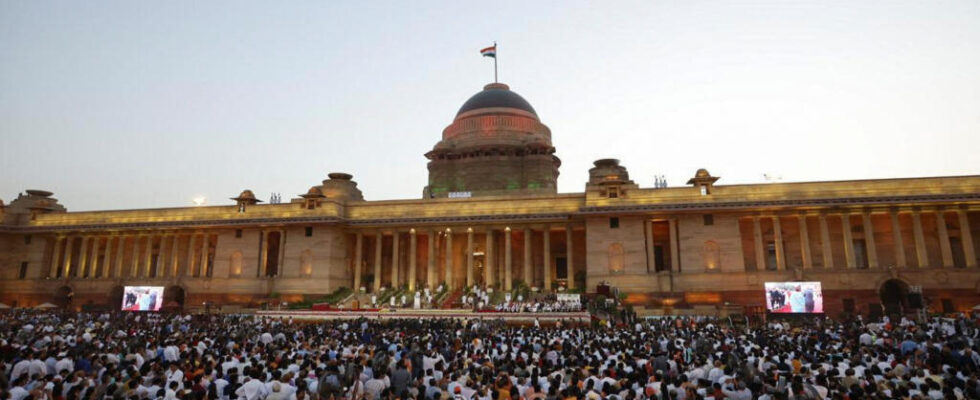The new Indian Federal Parliament resulting from the recently concluded legislative elections met this Monday, June 24. Narendra Modi remains Prime Minister, this will be his third term. Lacking an absolute majority, India’s strongman had to negotiate with regional parties to form the coalition, the National Democratic Alliance (NDA) which will now lead the country. Facing it, a heterogeneous alliance of opposition parties, led by the Congress party which doubled its score. After the newly elected deputies are sworn in, the lower house of Parliament will elect its president. The position of the speaker is strategic in the Indian parliamentary system. It is coveted by the allied parties of the government coalition. The analysis of Jean-Luc Racine, emeritus research director at CNRS (CEIAS/EHESS) and senior researcher at Asia Centre.
5 mins
RFI: For all lovers of democracy, the results of the legislative elections were a divine surprise, with the mixed performance of Narendra’s authoritarian party in power, while a tidal wave in its favor was expected. Were you, too, taken by surprise by these results?
Jean-Luc Racine : Indeed, the performance of the INDIA bloc, the alliance of opposition parties, surprised me, even if I did not expect 370 seats for the BJP of Narendra Modi in the Indian lower house, as l ‘ had announced the polls coming out of the polls. Together, the opposition parties managed to win 100 more seats than they had in the previous chamber, all parties combined. Despite the pre-election tensions between its different components, the opposition coalition behaved much better than expected. In a way, this election was a semi-defeat or a semi-victory for those in power, even if the latter won politically. The whole question now is whether Narendra Modi will be able to remake himself during this third term.
However, according to analysts, this mandate promises to be more difficult for Narendra Modi, because his party, not enjoying an absolute majority, had to negotiate with small parties to form the government.
In a way, we have returned to normality. Coalitions are the normality of Indian political life. Since independence in 1947, India has certainly experienced majority governments, but more often governments led by a dominant party in collaboration with allies. The last ten years during which the ruling party, in this case the BJP, enjoyed an absolute majority, have been extraordinary years. And, in this context, Narendra Modi’s statement proclaiming that his election for a third term is historic is not false since the exercise of a third term is not very frequent. The last Prime Minister to serve a third term was India’s first Prime Minister, Jawaharlal Nehru.
According to many observers, with room for maneuver limited by the rule of coalitional consensus, the nature of this third mandate of Narendra Modi will not be the same as that of the previous two.
We’ll see what happens. It is true that the government only holds together with allies that could be described as relatively uncertain, because they have the habit of changing sides frequently. The government coalition (the International Democratic Alliance, NDA) is made up of 15 parties including two important regional parties, namely the Telugu Desam which is in power in the southern state of Andhra Pradesh and the Janata Party which governs the state of Bihar (east). With their 16 and 12 seats, they constitute the two main pillars of the coalition. This currently has a total of 293 seats, while the absolute majority is at 272 seats. Under these conditions, if the two main allies of Narendra Modi’s BJP decide to withdraw from the coalition, the Prime Minister will have to resign, no longer having a majority. That said, these are just parlor thoughts, pure hypotheses. Especially since we cannot exclude the fact that if necessary, the BJP could continue to buy certain opposition deputies, as it has regularly done in recent years, drawing attention to the insoluble problem defections in politics in India.
All this also raises the question of the ability to play the game of the coalition of Narendra Modi who throughout his political life has been at the helm of majority governments.
This is a question that arises, especially since Chandrababu Naidu and Nitish Kumar, respective leaders of the Telugu Desam and the Janata Party, have regularly crossed swords with Narendra Modi, particularly on the question of the prerogatives of the regional states that they govern within the framework of a federal system. They are not particularly supportive of the Prime Minister’s Hindu nationalist agenda. Let us also remember that Nitish Kumar recently conducted the census by caste in the state of Bihar, something that Narendra Modi’s BJP, dominated by the upper castes, does not want to hear about. It will also be noted that neither Kumar nor Naidu entered the national government, while claiming important ministerial portfolios for their own. Moreover, of the 71 ministers in the new Modi government, only 11 positions were allocated to allies and the BJP figures all retained their positions, at the head of the sovereign ministries. Concessions had to be made to secure the support of allies, but the BJP did not reveal the nature and content of these concessions.
Parliament must unveil the name of the president of the lower house this Wednesday. Do you believe that this important position could go to a party allied with the government?
It would be a strong signal because this gesture would mean that we are completely in the majority within the majority, if I dare say so, but we are ceding the speaker’s place to our partners. This would make sense and would rebalance the positions of the different components of the coalition within a government where the major ministers of the BJP have all remained in place. I would be surprised if such a concession were to happen.
Read alsoIndia: Prime Minister Narendra Modi sworn in for a third term
